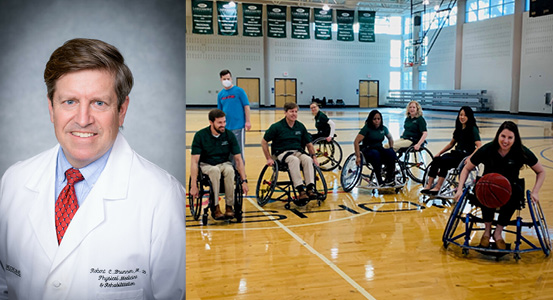 The UAB Department of Physical Medicine and Rehabilitation is leading the way in meeting the needs of individuals with disabilities through compassionate care, cutting-edge research, and training the next generation of professionals. We sat down with the Vice-Chair of PM&R Development, Robert Brunner, M.D. to discuss the department's continued growth and excellence in patient care.
The UAB Department of Physical Medicine and Rehabilitation is leading the way in meeting the needs of individuals with disabilities through compassionate care, cutting-edge research, and training the next generation of professionals. We sat down with the Vice-Chair of PM&R Development, Robert Brunner, M.D. to discuss the department's continued growth and excellence in patient care.
Q: Dr. Brunner, you’ve been a faculty member in UAB’s Department of Physical Medicine & Rehabilitation for over 20 years. Tell us more about your role and how it has evolved.
A: I’m proud to represent the work of UAB Medicine Rehabilitation. We’ve served and advocated for people with disability since UAB Spain Rehabilitation opened its doors in 1964. Over the years, my roles have changed. I have been involved with clinical, research, educational and operational activities. With our new Chair, Dr. Vu Q. C. Nguyen came a vision of an expanded leadership structure. My current leadership focus is on the development of our department within our health care system, faculty, and grateful patients all of whom want to help support us in our future vision.
My roles in the department include: Vice-Chair of Professional Development & Professor; Medical Director, Spain Rehabilitation Center; Project Director, UAB Traumatic Brain Injury Model System; Director, Traumatic Brain Injury Patient Services.
Q: What sets UAB Medicine Rehabilitation apart from other rehab hospitals?
A: UAB Medicine Rehabilitation is among the largest, integrated rehabilitation systems in the nation that serves the full spectrum of disability, neurorehabilitation, musculoskeletal, prosthetics, and sports care. In addition to traditional PM&R diagnostic groups, unique divisions within our department include inpatient and outpatient rehab and neuropsychology, comprehensive orthotics and prosthetics laboratory, and industry-leading occupational medicine practice. We have several unique interdisciplinary clinics such as wound care, transverse myelitis, and spina bifida. We are connected with The Children’s Hospital of Alabama and have transition clinics at UAB for those special populations that need on going care as an adult with disabilities.
On the research front, we are excited to share the renewal of our $3.4 million National SCI Statistical Center 5-year grant. UAB Rehabilitation has held the distinction of being the only NSCISC in the nation continuously since 1983. We were also successful in achieving renewals of our $2 million SCI Model Systems grant and a $2.2 million TBI Model Systems grant.
Q: I know it’s a priority to promote continued growth within the department. What’s been the focus to make that happen?
A: It takes the dedication from everyone that contributes to the success of UAB Medicine Rehabilitation - clinicians, researchers, residents, and team members. This past year we successfully recruited 6 physiatrists, 2 neuropsychologists, 2 certified orthotists/prosthetists, and 1 occupational medicine provider.
We also developed a new leadership team - Danielle Powell, M.D. named Vice-Chair of Clinical Operations; Yuying Chen, M.D., Ph.D. promoted to PM&R Director of Research; and Dale Colorado, D.O., M.P.H. named Vice-Chair of PM&R Education, Medical Director, Sports and Musculoskeletal Medicine, and Program Director for the PM&R Residency Program. This team will work with other faculty to set plans in motion for continued growth.
We initiated this process at a recent faculty retreat. In the coming year, the department is going to focus on recruiting additional researchers and clinician scientists to further our mission of expanding knowledge and training future clinicians.
Q: What was the goal of this year’s PM&R faculty retreat?
A: We always enjoy coming together as a group to focus on ways to offer the best patient care. This year our partner Lakeshore Foundation hosted our event. Being the home of U.S. Olympic & Paralympic Training Site, Lakeshore and UAB Rehabilitation share a mission to work with individuals with disabilities. We even had the opportunity to play wheelchair basketball. These were important team building exercises especially given our new faculty.
During the retreat we focused on three pillar goals: engagement, quality, and advancement of knowledge. We engaged in a robust discussion around wellness. Wellness is particularly important because of all the challenge health care workers face on a daily basis. As physiatrists we tend to focus on the health of the whole person, and that includes our team members.
Q: You talked about the department’s pillar goals. Can you walk me through what those goals entail?
A: Our group discussions focused on three pillar goals: engagement, quality, and advancement of knowledge.
1. Engagement- Develop and strengthen satisfying relationships and outreach between the department of PM&R and its patients, care teams, and community.
2. Quality- Implement standards and systems to continue achieving the best possible outcomes in clinical care and research.
3. Advancement of Knowledge - Support a learning health system that fosters and shares innovation and transforms care delivery for our patients.
Q: What excites you most about the future of UAB Medicine Rehabilitation?
A: UAB Medicine Rehabilitation continues to be ranked in the top 20 by US News & World Report. We’re thrilled that we’ll have the ability to serve more patients. In May, we broke ground on a new state-of-the-art UAB Inpatient Rehabilitation Hospital. It will be an 11-floor rehabilitation hospital connected to UAB Hospital via skywalks. The facility will feature a rooftop indoor/outdoor courtyard and therapy section, rehabilitation gyms on each floor, outdoor terrain park, multiple relaxing spaces for family and patients to explore, office and conference meeting space, parking for more than 200 vehicles, and will be our tertiary-referral flagship rehabilitation hospital. This new facility will provide limitless opportunities for exceptional patient care.